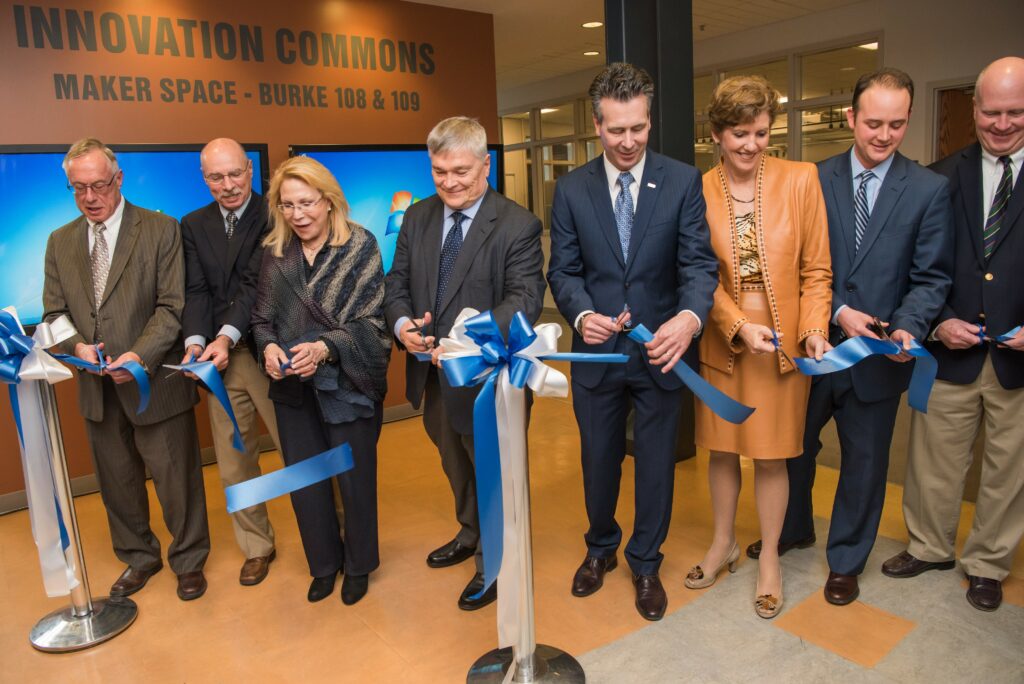Making Entrepreneurship Accessible in Rural America
Leadership at all levels.
Starting with the announcement of the initiative, President Barron set the university on a new course—one looking to re-imagine the role of the land-grant university.
Without the leadership of the university president, chancellors at individual campuses, directors who were developing and launching programs, and partners who could fill critical gaps in services, the initiative would not have had the impact it has had to date.
The Invent Penn State initiative required the organization to act differently, to leverage and encourage a very entrepreneurial approach.

Traits of effective leaders.
Consistent and vocal leadership at all levels was critical to building momentum and incentivizing action.
We found that effective leaders embodied six key characteristics.
Specifically, they:
- Encouraged and modeled a culture with entrepreneurial thinking at its core.
- Gave staff the freedom, and permission, to try new things, assess results, and change things up as needed.
- Understood the need for, and had tolerance for, experimentation even when outcomes were unclear.
- Buffered others from rigid and arduous processes and removed roadblocks to action.
- Aligned network success with individual goals.
- Publicly celebrated individuals who experimented with different approaches even when the outcomes weren’t so great.
-
Leadership at the highest level was critical for mustering resources and setting expectations.
Active and public leadership.
As the leader of the University, in addition to setting aside resources and funding, President Barron also actively set expectations, publicly spoke about the need and vision—both inside and outside the university—and personally recognized even the smallest step toward building out the network.Personal appearances.
He traveled to campuses to attend ribbon-cutting ceremonies and personally met and learned about the entrepreneurs accessing support.These ribbon-cuttings were also an opportunity to publicly recognize local partners and garner local news coverage to help emphasize the community nature of the LaunchBox.
Continued and consistent messaging.
His continued and consistent attention to the initiative sent the message that this wasn’t a passing trend or short-term focus, but something that was integral to our land-grant mission and potentially pivotal to the economic prosperity of the residents of Pennsylvania.Leading fund-raising efforts.
In order for the initiative to become sustainable, more funding was needed.To spur donations, the University made entrepreneurship a major element of their five-year philanthropic campaign, including offering to match funding of up to $1M for donations to a LaunchBox.
As the network saw the potential that robust LaunchBoxes created for local entrepreneurs and the potential to expand that impact through outside donations, excitement and momentum built.
Personally lobbying for state funds.
Finally, starting in year three, as demand for services was rapidly increasing and more success stories were emerging, the University—driven by Dr. Barron—started actively lobbying the commonwealth’s leadership for support for entrepreneurship in Pennsylvania.The network was helping to accelerate new business starts, helping entrepreneurs avoid costly mistakes, creating opportunities for students to learn critical entrepreneurial skills, and working to build a culture of innovation—all without direct support from the state.
In 2020, then Pennsylvania Gov. Tom Wolf proposed $2.35 million in state funding for Invent Penn State as part of a spending initiative focused on public-private partnerships in support of the state’s economy, and as an example of the University’s land-grant mission in action.
-
Effective leaders created accountability, momentum, and funding opportunities.
Establishing accountability.
Leadership was integral in building accountability and fueling momentum.Specifically, the VP of Penn State campuses, to whom all chancellors reported, required each to report on the strategy and progress made in standing up their local LaunchBox as part of their annual performance review. This created a level of accountability directly tied to chancellors’ work responsibilities.
Building momentum from day one.
Through the partnership with the Penn State Law Entrepreneur Assistance Law Clinic and the Intellectual Property Law Clinic, every location could, from day one, provide services to help de-risk businesses.Having access to these critical infrastructure services meant that chancellors and directors could start creating value for the local entrepreneurial community and building momentum right away.
Sharing success stories.
As momentum built, success stories of entrepreneurs leveraging LaunchBox services began to emerge.These stories were shared across the network and with the general public and acted as exemplars in what was possible, fueling alumni and donor giving.
-
Local leadership was critical for action and sustainability.
Putting the plan into action.
While President Barron set the vision and importance of the initiative, leadership at the campuses and with our potential partners was critical in putting the vision into action.Chancellors led the charge by setting aside local resources, allocating staff, identifying potential physical locations, and working to build community partnerships.
For many this was new territory, so it wasn’t without a learning curve.
Building local networks.
Directors of each location were asked to take the lead in defining and delivering on the promise of localized support. They were responsible for getting things done and experimenting with new programs that would help them learn and adapt to local needs.These local leaders were critical in establishing, growing, and sustaining localized services, and building partnerships.
Personal connections made a difference.
Those who were already well-connected, or who worked to build relationships with trusted individuals within the community, were able to experiment and adapt faster as they connected with, learned from, and partnered with entrepreneurs or those exploring starting a business.In short, they practiced what they preached by leveraging lean startup principles to identify the need, the “customer,” and the value they could provide to that group.
-
Leadership created partnering opportunities that jump-started local support.
Forging new partnerships.
Early partnerships have been key foundational steps in building an end-to-end infrastructure to support businesses across the commonwealth.Launching the first central service.
As mentioned, the leadership and action-oriented approach taken by the individual who started the Penn State Law Entrepreneurial Assistance Clinic was a key first step in helping to reduce risk for early-stage entrepreneurs across the state regardless of the type of business they were looking to start.As the first centralized service was a game changer for the initiative and allowed the network to start serving entrepreneurs regardless of their staffing or expertise.
Expanding services for underrepresented entrepreneurs.
The law clinics continue to grow along with demand for their services. Specifically:- The Entrepreneur Assistance Law Clinic launched an Underserved Small Business legal services program in 2021 to support entrepreneurs who are generally categorized as socially and economically disadvantaged.
- The Intellectual Property Clinic now acts as a clearinghouse for the United States Patent Office’s Patent Pro Bono program.
Building a referral network.
Similar to how a law firm builds a client base, these clinics have developed close relationships with Pennsylvania’s 15 Small Business Development Centers and many other economic development organizations across the state.Leadership within the Penn State Small Business Development Center helped to increase awareness with entrepreneurs and created a referral path for growth-stage business owners.
Consultants with the Small Business Development Center could refer early-stage entrepreneurs to a local LaunchBox, and LaunchBox staff could refer more established business owners to Small Business Development Center business consultants.
Discover More
Dive deeper into the eight critical actions that are foundational for building entrepreneurial ecosystems that support rural communities.
- Start with engaged leadership
- Encourage and reward experimentation
- Look for common gaps in services and start there
- Provide centralized support to promote growth and scaling
- Bring an inclusive lens to everything you do
- Avoid couching success through traditional economic development metrics
- Focus on sustainability early
- Focus on culture, not physical space

Read a special note from the Kauffman Foundation about the value of the Playbook.

